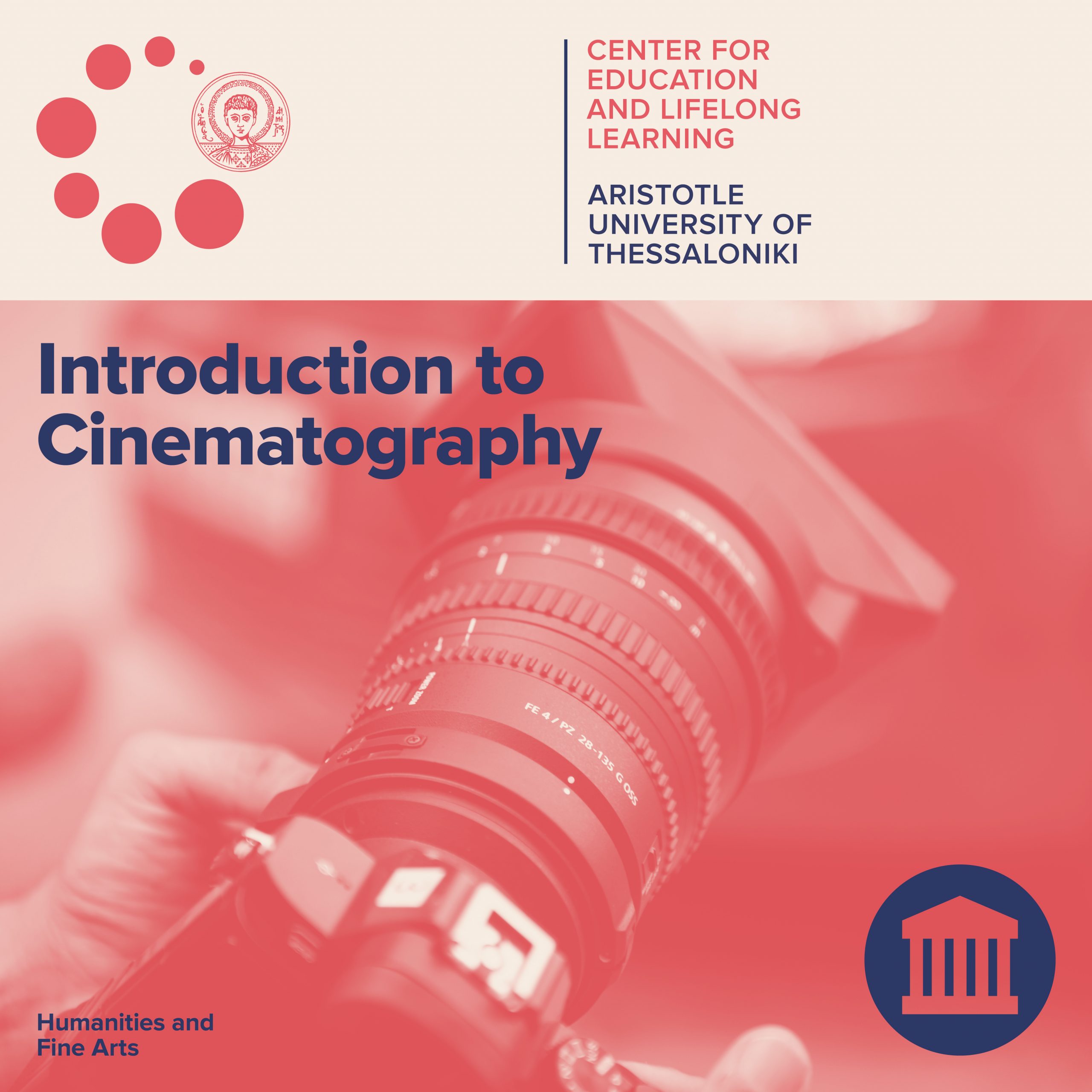2022-12-19 - 2023-05-30 ( )
Εξ αποστάσεως
Βάσει εκπτωτικής πολιτικής
Η υποβολή αιτήσεων ολοκληρώνεται στις

The Center for Education and Lifelong Learning of the Aristotle University of Thessaloniki welcomes you to the “Introduction to Cinematography”, a Twenty four hour online course via e-learning.
The Director of the Program is (Panayiotis Salapatas, Associate Professor, School of Film, Facculty of Fine Arts, Aristotle University of Thessaloniki. Panayiotis (Peter) Salapatas is also a practicing profsesional and a member of the G.S.C (Greek Society of Cinematographers).
Participation fees/Discount
The cost of the program is 270 euros.
Application
Candidates submit the application form online.
Each application has to be accompanied by the following document or copies:
1. A short biographical note
2. Any certificates pertaining to the course
3. Any films that the participant has made
Contact
For further information, please contact: Panayiotis Salapatas at psalapatas@film.auth.gr
The objective of this online course is to approach the art of cinematography mainly from a practical perspective as well as from a theoretical one.
Upon completion of the course, participants will: understand the basic principles of cinematography, communicate easier with the directors, understand the history of cinematography and use it to design their films. A number of excercises/assigments will be given for each thematic unity. Assigments will be discussed during the class.
Participant selection & Requirements
All potential participants are welcome.
► Internet access
► Personal email
► Access to a basic digital camera with a separate lens and a tripod.
► Basic knowledge of photography will prove to be helpful .
► Access to a number of basic lights (optional)
There will be an interview with all potential candidates in order to understand their past in terms of photography/cinematography and assess their needs.
The course (one complete cycle) is structured on a weekly basis. Each week there will be a two hour class live through e-learning.
Educational Material
1. Articles
2. Excercises/Assigments
3. Films and videos that apply directly to the course (included short and feature films that Peter Salapatas has
worked on)
Upon completion of this course the student will be awarded 2 ECTS.
Course of the Program (12 thematic unities)
All thematic unities are 2 hours each.
| #1 Lenses | Types of lenses and ways they influence/support the story |
| #2 Cameras | Sensor, Camera positions, Monitors, Framing
ASSIGMENT 1 |
| #3 LIGHT part 1 | What is light, Natural vs Artificial, Four aspects of light. Ways to control light. |
| #4 LIGHT part 2 | Three point lighting, Lighting ratios, Measuring light, How does light support the story and bring forth the inner world of the character.
ASSIGMENT 2 |
| #5 The shooting process | Working with the director, Ways to approach a scene, Moving the camera, Master shots, Close ups. |
| #6 The Long Take | Examples from world cinema, How can the long take support the story
ASSIGMENT 3 |
| #7 Cinematic Space part 1 | Different kinds of cinematic spaces |
| #8 Cinematic Space part 2 | Continuation of part 1. Controlling the lines, color and rythm of a scene.
ASSIGMENT 4 |
| #9 Painting and Cinema | The relationship between cinema and painting.
ASSIGMENT 5 |
| #10 Image semiotics. Denotation and connotation | How a photo or an audiovisual piece produces meaning and how it is related to the cultural context. |
| #11 Semiotics: Narration and Myth | How does narration and the audiovisual choices create a myth around characters and objects.
ASSIGMENT 6 |
| #12 Zen and the art of cinematography | Ways a cinematographer understand the shot/sequence. Way she/she relates to the story. |
There are 6 assigments for the whole course which will be given in class and which are related to each thematic unity. Each assigment will not take more then two to three hours to complete. There will also be given two online quizes for revision purposes.
In addition at the end of the cycle a short film (2 or three minutes) or a photostory (max 15 photographs) will be required.
Upon successful completion of the course, participants will be awarded a Certificate of Completion.
For the successful completion of the program, the participants should:
A) have attended all the teaching units. Absences may not exceed 10% of the scheduled training hours.
B) have passed the exams or (περιγράψτε τον τρόπο εξέτασης και βαθμολόγησης)
C) have paid all the tuition fees by one month into the course
Participants, who have attended but not completed successfully, will be awarded a Certificate of Attendance.
For further information, please contact: Panayiotis salapatas at psalapatas@film.auth.gr
Μπορείτε να εγγραφείτε στο Newsletter για να μαθαίνετε πρώτοι για τα νέα προγράμματα του ΚΕΔΙΒΙΜ ΑΠΘ.